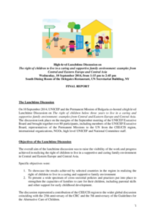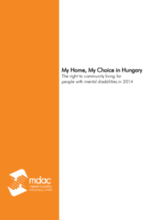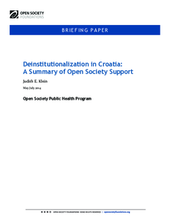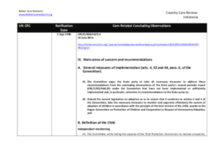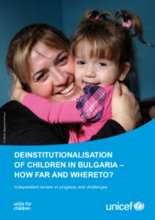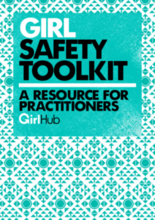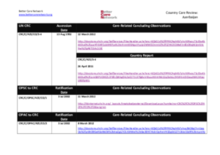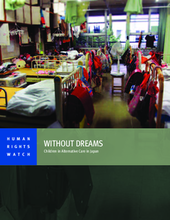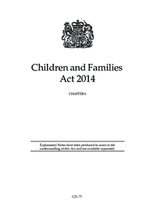Displaying 341 - 350 of 477
On 10 September 2014, UNICEF and the Permanent Mission of Bulgaria co-hosted a high level Lunchtime Discussion on The right of children below three years to live in a caring and supportive family environment: examples from Central and Eastern Europe and Central Asia.
Despite Hungary signing on to the UN Convention on the Rights of Persons with Disabilities (CRPD), there has been no significant change in the number of people with disabilities in Hungary who are placed in institutions. Mass institutionalisation continues to be the predominant form of care for people--including many children--with mental health issues and intellectual disabilities.
This study focuses on examining the mediating effects of social support on familial well-being or quality of life in order to help professionals identify and enhance sources of support for all grandparent caregivers.
This paper examines the benefits and challenges of de-institutionalizing disability residential services in Croatia through Open Society Foundation’s Mental Health Initiative (MHI).
This country care review includes the care related Concluding Observations adopted by the Committee on the Rights of the Child as part of its examination of the third and fourth periodic reports of Indonesia (CRC/C/IND/CO/3-4) during its 65th Session at its 1890th and 1891st meetings held on 5 June 2014, and adopted, at its 1901st meeting, held on 13 June 2014.
This Review, commissioned by UNICEF Bulgaria, is aimed at informing the recommendations for the Bulgarian Government’s Action Plan for the implementation of the National Strategy ‘Vision for Deinstitutionalisation of Children in Bulgaria.’
This tooklit provides a comprehensive guide to designing safe programmes specifically for adolescent girls.
This country care review includes the care related Concluding Observations adopted by the Committee on the Rights of Persons with Disabilities as part of its examination of the first periodic report of Azerbaijan under Convention on the Rights of Persons with Disabilities at its 125th and 126th meetings, held on 1 and 2 April 2014, respectively.
This report by Human Rights Watch examines Japan’s alternative care system for children. It describes its organization and processes, presents current data on the use of different forms of alternative care and highlights the problems found in the institutionalization of most children (including infants), as well as abuses that take place in the system.
An Act in the United Kingdom to make provision about children, families,and people with special educational needs or disabilities; to make provision about the right to request flexible working; and for connected purposes.

